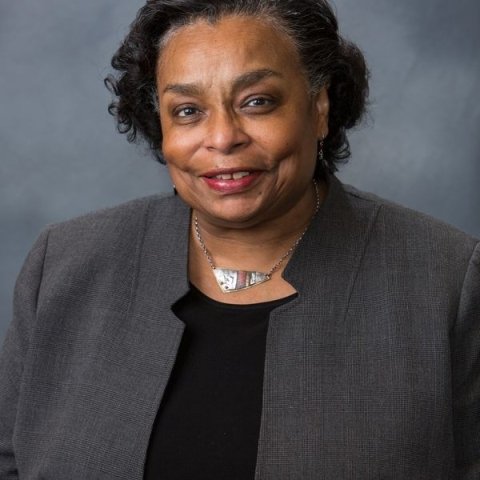Dianne Pinderhughes
Former Fellow
Professional Affiliation
University of Notre Dame
Expert Bio
Dianne Pinderhughes is Notre Dame Presidential Faculty Fellow, and Professor in the Department of Africana Studies and the Department of Political Science. She holds a concurrent faculty appointment in American Studies, is a Faculty Fellow at the Kellogg Institute, and is a Research Faculty member in Gender Studies at the University of Notre Dame. Pinderhughes’s publications include Uneven Roads: An Introduction to US Racial and Ethnic Politics (co-author; 2014); Race and Ethnicity in Chicago Politics: A Reexamination of Pluralist Theory (1987); Black Politics After the Civil Rights Revolution: Collected Essays (forthcoming); Race, Gender, and the Changing Face of Political Leadership in 21st Century America (co-author; forthcoming). Pinderhughes has also been a Fellow at the Woodrow Wilson International Center for Scholars (2003-04).
I was born in Washington, D.C. in 1947, the elder daughter of Rosa T. and D. James Pinderhughes, Jr. My mother and her mother were also born in Washington, while my father was born in East Providence, RI. My father, the first born Pinderhughes, fought in WWII and worked in the Post Office. My mother was first a housewife and later a teacher's aide in the Washington, D.C. schools. In Washington, D.C., the racially segregated and non-voting capital of American democracy, I first grasped the contradictions of race and democracy in American public life. These interests shape my intellectual work, and my life within academic institutions and organizations. Race and Ethnicity in Chicago Politics, A Reexamination of Pluralist Theory (1987), explored African American, Italian, and Polish Chicagoans' political participation during the first decades of the twentieth century. I found distinct differences in how the economic and political spheres responded to these groups, and concluded that Blacks suffered greater patterns of discrimination. After completing this work, I began to examine African Americans' influence on public policy at the national level, writing several pieces for the National Urban League's State of Black America on electoral politics (1984 and 1986), presidential politics (1988) and the Persian Gulf War (1991). I developed an interest in the political extension campaigns for the 1965 Voting Rights Act, (1995, 2002) which led again into a comparative focus. I pursued this study, my Woodrow Wilson Project, over several decades; I combine my historical interests in the evolution of African American civil society institutions in the 20th century, and their influence on the formation of voting rights policy, with the development of racial and ethnic coalitions after 1965. It has taken a long time to grasp the multiple dimensions on which politics and policymaking is grounded in the American polity, because I have been so deeply rooted in the past construction of those politics. I also spent many years as a faculty member involved in the institutional processes associated with racial integration within Dartmouth College (1975-84), the University of Illinois, Urbana (1984-present), and within disciplinary organizations within political science. I served in official positions in the National Conference of Black Political Scientists, the American Political Science Association, and the Black Faculty Caucus at Dartmouth College.At The University of Illinois, Urbana Champaign, I served as Director of the Afro-American Studies and Research Program from 1987-90 and 1991-2000. During those years I led the expansion of the faculty, developed a program to integrate interdisciplinary information related to Afro-American Studies into the Illinois high school curriculum through summer teachers' institutes, and initiated a Diaspora Studies Project. I also taught in the Afro-American Studies Program and the Department of Political Science, including courses on voting rights policies, Black politics, and comparative racial and ethnic politics.I have spent my intellectual and professional life exploring, understanding, and changing the construction and contradictions of the polity I first saw from a distance and through the barriers of American racial segregation in Washington, D.C.
Education
B.A. (1969) Political Science, Albertus Magnus College; M.A. (1973) Political Science, The University of Chicago; Ph.D. (1977) Political Science, The University of Chicago
Subjects
Civil Liberties/Civil Rights,Race and Politics
Experience
- Professor, Department of Political Science and Afro-American Studies and Research Program, University of Illinois at Urbana-Champaign, 1991-present
- Individual Project Fellowship, The Open Society Institute, June 2000- November 2001
- Director, Afro-American Studies and Research Program, University of Illinois at Urbana- Champaign, 1991-2000
- Guest Scholar, The Brookings Institution, 1995
- National Research Council, Ford Minority Postdoctoral Fellow, and Postdoctoral Fellow, University of California, Los Angeles, Center for Afro-American Studies, Institute of American Cultures, 1984-85
- Assistant Professor of Government, Dartmouth College, 1978-84
Expertise
American and comparative racial and ethnic politics; civil society and interest groups; gender and multicultural leadership
Wilson Center Project
"The Evolution of Civil Rights Organizations in the Twentieth Century: African American Politics and the Voting Rights Act"
Project Summary
This study explores the problems African Americans faced in seeking to create a space within the polity, and evaluates how those strategies and organizations have been incorporated into political life after their entrance into the American political system. Creativity, innovation, coalition formation, and political mobilization, vital parts of Black political activities in the first half of the century, slowed and shifted focus in the last third of the century. The Voting Rights policy arena after 1965 illustrates their difficulties in encouraging political participation, in translating protest into politics, and in developing the rationale for contacting and interacting with public officials.
Major Publications
- Race and Ethnicity in Chicago Politics, A Reexamination of Pluralist Theory (University of Illinois Press, 1987)
- "Black Interest Groups and the 1982 Voting Rights Extension," Blacks and the American Political System (University Press of Florida, 1995)
- "Voting Rights Policy and Redistricting: An Introductory Essay," in "Symposium: Race and Representation," National Political Science Review, Race and Representation (Transaction Publishers, 1997)
Insight & Analysis by Dianne Pinderhughes
Filter
- Video
And Still They Rose: The History of an Unfree People


